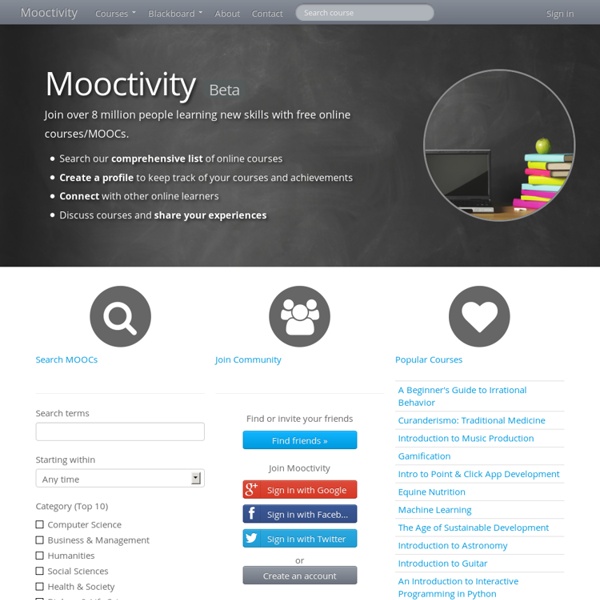



10 points clefs pour réussir son MOOC 1. Avoir un très bon cours de départ Premier conseil, pouvant sembler évident, "il faut avant tout avoir un très bon cours comme point de départ", avance Rémi Bachelet, maître de conférence à Centrale Lille, créateur du MOOC "Gestion de projet". 2. Prendre en compte le facteur temps Comment transformer votre certification de Mooc en atout? Les certifications de Mooc sont peu reconnues, que faire? Les Mooc ont révolutionné l’enseignement tout au long de la vie en permettant à tous (au sens le plus large) de profiter de formations de grandes écoles gratuitement. Pourtant, il reste un problème, les certifications délivrées par ces Mooc (souvent payantes d’ailleurs), ne sont pas reconnues en entreprise. Une certification n’est pas un diplôme, mais...
Trouver son MOOC : 12 plates-formes au banc d’essai Tous les jours ou presque, un MOOC est lancé par une école ou une université. Résultat : des milliers de ces cours ouverts en ligne vous sont accessibles dans le monde entier. Mais où dénicher celui qui vous correspondra ? En visitant d’abord les différentes plates-formes (FUN, Coursera, edX…) où les MOOC sont hébergés. Voici de quoi comprendre vers lesquelles vous tourner selon ce que vous cherchez.
Le plaisir reste le meilleur moteur de l'apprentissage Comment vous est venue cette idée de transfert de cours vers du numérique ? En fait, ce n’est absolument pas du transfert c’est créer quelque chose de nouveau et imaginer une nouvelle valeur. Transférer c’est détruire de la valeur. Il 3 évènements importants qu’il faut comprendre : Répertoire des cours ouverts et Moocs - Pour apprendre gratuitement, voici des cours ! Au début, beaucoup de plates-formes de cours ouverts étaient offertes par de grandes institutions ou à l'initiative d'organismes appuyés par des fondations. On y trouvait le MIT et plusieurs partenaires du consortium OCW, mais maintenant le mouvement s'étend aux initiatives gouvernementales et privées qui s'adressent aux professionnels et à ceux qui veulent le devenir. Nous avons inclus à ce répertoire les cours de Khan Academy, qui se déclinent maintenant en plusieurs langues dont le français, ceux de Code Academy, de Ted Ed, de Néomédia, de d'autres institutions indépendantes et sans doute encore d'autres dans le futur. Les cours ouverts ne donnent pas souvent de certification reconnue, mais couplés à un système indépendant de badges, comme Open badges, la certification indépendante, communautaire, sociale ou autre formule commence à apparaître et être reconnue dans plusieurs domaines professionnels. P2PU et BadgeOS pour WordPress ont déjà commencé ! Universités numériques thématiques :
Comment la collaboration au sein des MOOC améliore-t-elle l’experience de formation ? Selon les statistiques, la collaboration permet d’améliorer les taux de rétention des élèves et les résultats d’apprentissage dans les MOOC. C’est aussi, ce qui permet aux participants de donner le meilleur d’eux-mêmes en maintenant leur engagement tout au long de la formation. En donnant la possibilité à chacun de se former, les MOOC et l’e-learning sont en train de redistribuer les cartes de l’enseignement et de la formation.
Comment devenir formateur : les 10 commandements du formateur débutant / Guide Maestro Conseils Article écrit par Guide Maestro 204 formateurs expérimentés ont accepté de partager avec nous leurs conseils de pros destinés aux formateurs débutants. Nous avons synthétisé leurs recommandations afin de déterminer les 10 conseils infaillibles pour réussir dans ce métier. 1. Connais ton marché aussi bien que toi-même. 5 annuaires en ligne pour trouver des Mooc francophones On ne présente plus les Mooc. Formations en ligne ouvertes à tous ou massive open online course en anglais. Après un démarrage quelque peu poussif, les Mooc se sont développés à grande vitesse. L’appellation Mooc est même entrée dans la dernière version du Larousse. Ces cours à distance sont tellement nombreux qu’il est même difficile de trouver son bonheur tant le choix est vaste.
Décoder le code Description du cours 4 semaines pour découvrir l’univers du code informatique : ses codes, ses langages, ses pratiques. La pédagogie Simplon.co repose sur acquisition de savoir-faire, vous allez donc aussi pratiquer ! Sur quoi porte ce parcours ? Le code informatique reste pour la plupart d’entre nous un monde à part, qui nous semble mystérieux.